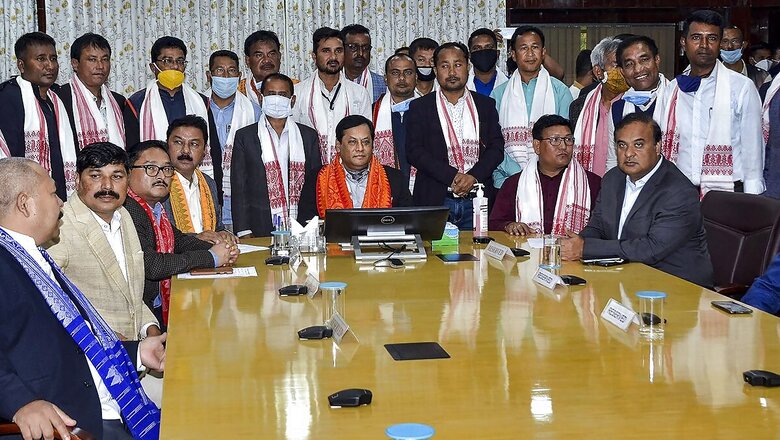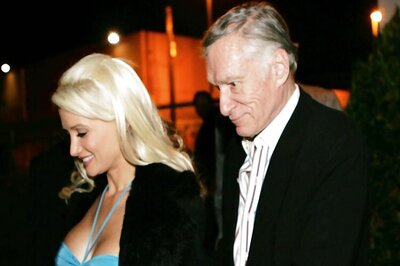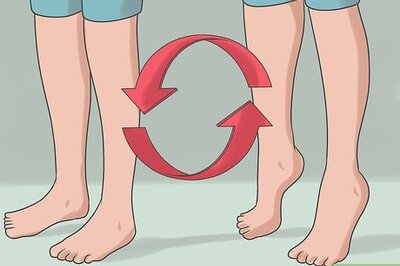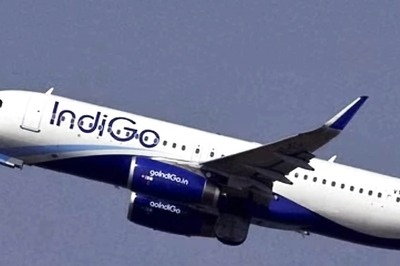
views
The final outcome, and not necessarily the results, of the just-concluded elections to the Bodoland Territorial Council (BTC) in Assam was along expected lines.
On Tuesday, former All Bodo Students Union (ABSU) chief Pramod Boro took oath as chief executive member of the BTC at a jam-packed ceremony in Kokrajhar, which was attended by Bharatiya Janata Party (BJP) top guns, including chief minister Sarbananda Sonowal and BJP ‘master strategist’ and minister Himanta Biswa Sarma.
The 2020 BTC election has a clear BJP imprint all over it. That this election will bring an end to 17 years of ruling by the Bodoland People’s Front (BPF) was planned much before anybody could have realised. Though the once-formidable BPF chief Hagrama Mohilary fought very hard – the BPF emerged as the single largest party by winning 17 out of 40 BTC seats – he was very tactfully shown the door by none other than his former ally, BJP.
The new council, a body under the Sixth Schedule of the Indian Constitution, is being formed by the Pramod Boro-led United People’s Party Liberal, BJP and Gana Shakti Party, led by Kokrajhar MP Naba Kumar Sarania. While the UPPL bagged 12 seats, the BJP and GSP won 9 and 1 seats respectively.
It appears the plan to oust the BPF from the Bodo council was drafted almost a year ago, when the ruling BJP hurriedly cleared the Bodo Accord. The BJP hailed the “historic” agreement, claiming it would end decades-long armed conflicts in areas dominated by the indigenous Bodo community in Assam.
The peace agreement was signed with factions of the National Democratic Front of Bodoland (NDFB), and the All Bodo Students’ Union (ABSU), then led by Pramod Boro, on January 27.
While the NDFB had led an armed separatist movement since the late 1980s, seeking to create a “sovereign Bodoland”, the ABSU had been demanding a separate state comprising Bodo-dominated areas on the north bank of the Brahmaputra in Assam.
Beginning of the end
The accord, signed with much fanfare, was, in fact, the beginning of the end for Mohilary’s BPF. The only person who hogged the limelight during and after the signing of the accord was Pramod Boro, something that did not go down well with the BPF leadership.
An influential student leader, Boro was believed to be instrumental in bringing the NDFB factions to the negotiation table, leading to the signing of the accord. In fact, the BJP made it look like that the accord was possible only because of Boro.
Weeks after the signing of the accord, Mohilary, a former militant of the now-defunct Bodo Liberation Tigers (BLT), had expressed his displeasure in so many words: “The new accord only changes the name of BTC to Bodoland Territorial Region (BTR). As it gives us nothing, we won’t use BTR as a part of our vocabulary.”
The accord promises to replace the existing Bodoland Territorial Area Districts (BTAD) with BTR that will have more administrative powers. Even the number of districts would be increased to nine from the existing four.
In the following months, the tension between the BPF and its former ally BJP grew manifold. There were allegations of large-scale corruption in the Mohilary-led Bodo council. The UPPL had even demanded a probe by the Central Bureau of Investigation into alleged irregularities to the tune of Rs 100 crore in the various departments in the council.
How BPF was cornered
By the time the BPF started facing the heat from all directions, Pramod Boro had consolidated his own space and that of his own party. Days after the signing of the accord, Boro joined the UPPL, a regional party formed in 2016. On February 25, he was made president of the party at a meeting in Baksa district.
Soon, the UPPL showed its inclination towards the BJP. UPPL founder and former Rajya Sabha member UG Brahma also announced, much to the discomfiture of the BPF, that “we sincerely think it is the moral responsibility of the BJP to work hand in hand with the signatories of the pact, which the party materialised, for effective implementation of the clauses”.
In March, more than 30 top leaders from different NDFB factions joined the UPPL at a function held at Dotoma in Kokrajhar, making it a formidable force against the BPF.
In between these developments, Pramod reportedly made trips to Delhi to meet the BJP top brass, including union home minister Amit Shah.
Probably the biggest highlight of this election is the significant rise in BJP’s own seats, from just one in 2015 to nine this time. It is another debate that BJP always grows at the expense of its regional allies. For instance, the BJP’s ally Asom Gana Parishad (AGP) — the party that was born out of six-year anti-foreigner agitation in the 1980s and ruled the state for two complete terms is now gasping for breath.
The saffron party, which contested the polls alone, kept everyone guessing until the results were out and the BPF was left in the lurch despite being the single-largest party. With assembly polls barely four months away, the BJP made sure that it does not face any hurdle in the Bodo-dominated areas in the state.
The Bodos are the third-largest linguistic community in the state after the Assamese and the Bengalis. There are 14.16 lakh Bodo speakers out of the 3.1 crore population in Assam, according to the 2011 Census.
Read all the Latest News, Breaking News and Coronavirus News here




















Comments
0 comment